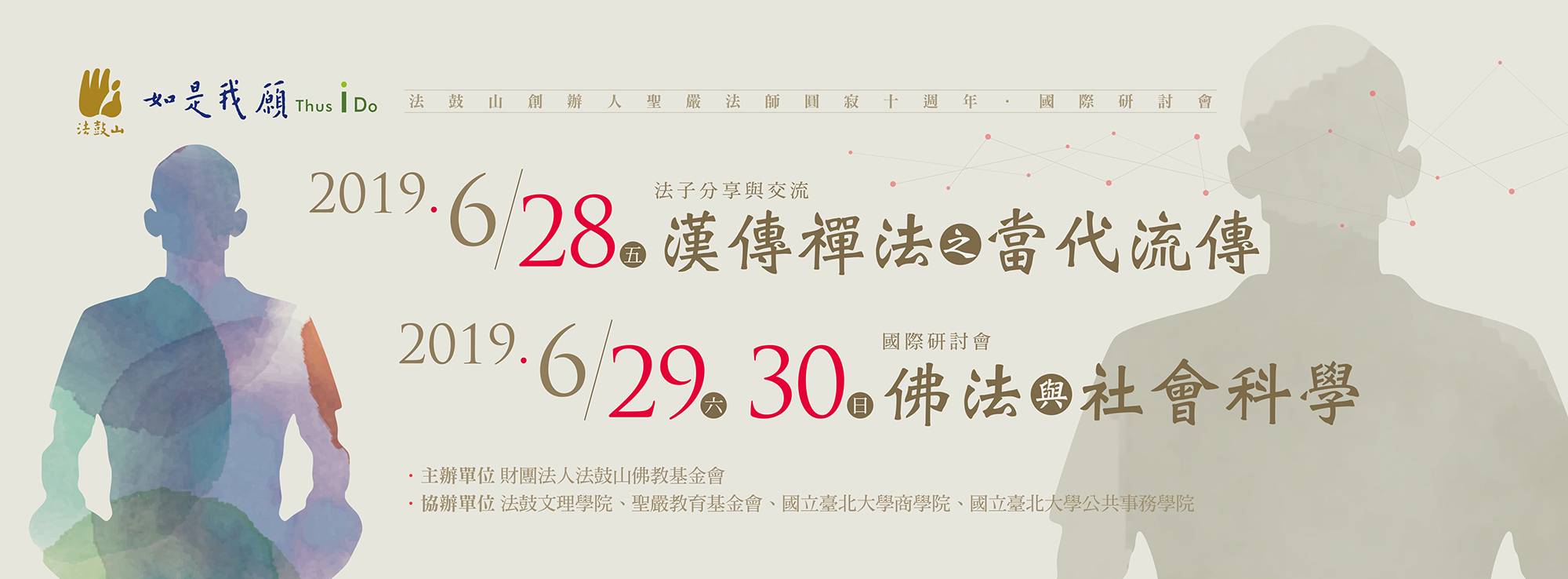經濟富足與心靈安樂 —
聖嚴法師「建設人間淨土」思想對「佛教經濟學」理論之啟示
許永河
本文以聖嚴法師「心靈環保」與「建設人間淨土」之思想為核心,嘗試摸索其思想對近代「佛教經濟學」理論發展的可能啟發處。除一方面將佛教的基本教理整理,另方面也將聖嚴法師思想的學術價值做不同角度的詮釋,並對佛教的幸福經濟學依據「心靈環保」的觀念,提出永續幸福發展的初步理論論述。
主流經濟學與佛教經濟學的差異在於對欲望或快樂的看法的不同。對主流經濟學來說,幸福或效用是來自於擁有的物質或財富的增加所致。盲目追求物質消費擴大的結果,是大量的生產伴隨資源的耗竭,以及生產過程所產生的廢棄物對生活環境和自然環污染的問題。佛教經濟學不同意幸福感以消費水準做為評量依據的看法,而認為以「最少的消費」達到「最大的滿足」才是幸福。幸福不能以物質消費來衡量,而是以苦惱的減少來達成,而苦惱與貪欲有關,
本文中回顧主流經濟學、佛教經濟學、心理學,以及希臘哲學的幸福觀,再參酌佛教的基本教理、太虛大師「五乘教」,以及聖嚴法師「心靈環保」與「建設人間淨土」思想,並依據聖嚴法師「心靈環保」的理念,提出「心靈環保國富論」的見解,作為追求經濟富足與心靈安樂社會永續發展的構想,也補充現有佛教經濟學理論完整性之不足。唯本文之「心靈環保國富論」構想仍在發展中,將於日後繼續修改充實
關鍵詞:聖嚴法師、心靈環保、建設人間淨土、佛教經濟學、心靈環保國富論
Economic Prosperity and Happy Life: On Master Sheng-Yen’s “Building Pure Land on Earth” and Its Inspiration on Buddhist Economic Theory
Yuan-Ho Hsu
The mainstream neoclassical economics has “self-interest” and “competition” as its foundations for the analysis of market efficiency in the capitalist economy. Utility maximization and profit maximization are considered as axioms of efficient market outcomes. Utility is used as synonym of life satisfaction or happiness. Pursing a non-stopping economic growth becomes a mean to achieve the gratification of insatiable desires. The unfortunate outcomes of global warming, natural resources depletion, and income inequality are among various negative impacts on the human environment that had been blamed for the irresponsibility of the market system. The mainstream economics has been accused of being incapable of solving these problems.
The Buddhist economics criticizes the mainstream economics by introducing economic theories based on the ethics of Buddha’s teaching. Contrast to the mainstream economics, the Buddhist economics claims that happiness doesn’t lie on the material consumption, but on the status of mind. While mainstream economics proposes the principle of maximizing consumption with the optimal pattern of production, Buddhist economics treasures maximizing human satisfaction with the optimal consumption pattern. Moreover, the Buddhist economics proposes alternative principles of economics activities, such as minimizing suffering, simplifying desires, non-violence, compassion and genuine care.
This study aims to develop an alternative theoretical framework for the Buddhist Economics study, based on Master Sheng-yen’s preaching of “Protecting the Spiritual Environment” and “Building Pure Land on Earth.” The integrated theoretical framework has consumption, production, employment, social environment, and natural environment in the setting. The aim is to develop a society that could achieve sustain happiness and economic prosperity. The core value of economic activities in the society is to protect the spiritual environment so that the quality of life and purity of the living environment can be preserved.
